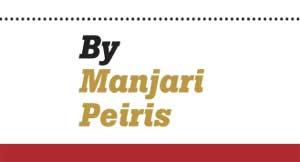Reply To:
Name - Reply Comment
Last Updated : 2024-04-23 22:35:00
- Parents and other members of the community should also take measures to promote their own health
- A smoker in Sri Lanka would have to spend 31.94 percent of their average income
On May 31, the WHO and global partners celebrated World No Tobacco Day and this year’s campaign focuses its attention to raise awareness on the harmful and deadly effects of  tobacco use and second-hand smoke exposure, and to discourage the use of tobacco in any form.
tobacco use and second-hand smoke exposure, and to discourage the use of tobacco in any form.
Thus the theme for this year’s WNTD is “Tobacco and lung health” through which the campaign will increase awareness on: the negative impact that tobacco has on people’s lung health, from cancer to chronic respiratory disease,the fundamental role lungs play in the health and well-being of all people.
The campaign also serves as a call to governments for action, advocating for effective policies to reduce tobacco consumption and engaging stakeholders across multiple sectors in the fight for tobacco control.
Lung health is not achieved merely through the absence of disease, and tobacco smoke has major implications for the lung health of smokers and non-smokers globally.
Tobacco smoking is the primary cause of lung cancer, responsible for over two thirds of lung cancer deaths globally. Second hand smoke exposure at home or in the work place also increases risk of lung cancer. Quitting smoking can reduce the risk of lung cancer, after 10 years of quitting smoking, risk of lung cancer falls to about half that of a smoker.
Tobacco smoking is also the leading cause of chronic obstructive pulmonary disease (COPD), a condition where the build-up of pus filled mucus in the lungs resulting in a painful cough and agonizing breathing difficulties. The risk of developing COPD is particularly high among individuals who start smoking at a young age, as tobacco also exacerbates asthma, which restricts activity and contributes to disability. Early smoking cessation is the most effective treatment for slowing the progression of COPD and improving asthma symptoms.
Young children exposed to second-hand smoke are at risk of the onset and exacerbation of asthma, pneumonia and bronchitis, and frequent lower respiratory infections. Globally, an estimated 165000 children die before the age of 5 of lower respiratory infections caused by second-hand smoke. Those who live on into adulthood continue to suffer the health consequences of second-hand smoke exposure, as frequent lower respiratory infections in early childhood significantly increase risk of developing COPD in adulthood.
- "Tobacco smoking is also the leading cause of chronic obstructive pulmonary disease"
- "Young children exposed to second-hand smoke are at risk of asthma, pneumonia and bronchitis"
Tuberculosis (TB) damages the lungs and reduces lung function, which is further exacerbated by tobacco smoking. The chemical components of tobacco smoke can trigger latent  infections of TB, which around a quarter of all people are infected with. Active TB, compounded by the damaging lung health effects of tobacco smoking, substantially increases risk of disability and death from respiratory failure.
infections of TB, which around a quarter of all people are infected with. Active TB, compounded by the damaging lung health effects of tobacco smoking, substantially increases risk of disability and death from respiratory failure.
Tobacco smoke is a very dangerous form of indoor air pollution: it contains over 7,000 chemicals, 69 of which are known to cause cancer.Though smoke may be invisible and odourless, it can linger in the air for up to five hours, putting those exposed at risk of lung cancer, chronic respiratory diseases, and reduced lung function.
Thus in order to achieve the Sustainable Development Goal (SDG) target of a one-third reduction in NCD premature mortality by 2030, tobacco control must be a priority for governments and communities worldwide. Currently, the world is not on track to meeting this target.
Countries should respond to the tobacco epidemic through full implementation of the WHO FCTC and by adopting the MPOWER measures at the highest level of achievement, which involves developing, implementing, and enforcing the most effective tobacco control policies aimed at reducing the demand for tobacco.
Parents and other members of the community should also take measures to promote their own health, and that of their children, by protecting them from the harms caused by tobacco.
The World Health Organization (WHO) is committed to fighting the global tobacco epidemic by adopting the Framework Convention on Tobacco Control (WHO FCTC) which was entered into force in 2005 with over 181 Parties covering more than 90 percent of the world’s population. The FCTC which is an evidence-based treaty that reaffirms the right of people to the highest standard of health, by providing legal dimensions for international health cooperation and of high standards for compliance, it is indeed a milestone in the promotion of public health.
"TB damages the lungs and reduces lung function, which is further exacerbated by tobacco smoking"
WHO introduced a practical, cost-effective way to scale up implementation of the main demand reduction provisions of the FCTC in 2008 on the ground: MPOWER. Each MPOWER measure corresponds to at least one provision of the FCTC. These measures are; Monitor tobacco use and prevention policies. Protect people from tobacco use. Offer help to quit tobacco use. Warn about the dangers of tobacco. Enforce bans on tobacco advertising, promotion and sponsorship. Raise taxes on tobacco.
The most effective measure to improve lung health is to reduce tobacco use and second-hand smoke exposure. But knowledge among large sections of the general public, and particularly among smokers, on the implications for the health of people’s lungs from tobacco smoking and second-hand smoke exposure is low in some countries. Despite strong evidence of the harms of tobacco on lung health, the potential of tobacco control for improving lung health remains underestimated.
Tobacco control must be considered a priority for governments and communities worldwide, in order to achieve Sustainable Development Goal (SDG) with a target of a one-third reduction in NCD premature mortality by 2030. Currently, the world is not on track to meeting this target.
Countries should respond to the tobacco epidemic through full implementation of the WHO FCTC and by adopting the MPOWER measures at the highest level of achievement, which involves developing, implementing, and enforcing the most effective tobacco control policies aimed at reducing the demand for tobacco.
International efforts to control non-communicable diseases (NCDs), TB and air pollution for promoting health are the cross-cutting theme of tobacco and lung health which has implications for other global processes. It serves as an opportunity to engage stakeholders across sectors and empower countries to strengthen the implementation of the proven MPOWER tobacco control measures contained in the WHO Framework Convention for Tobacco Control (WHO FCTC).
- "Tobacco smoke is a very dangerous form of indoor air pollution"
- "More than 12,300 Sri Lankans are killed by tobacco caused disease"
A smoker in Sri Lanka would have to spend 31.94 percent of their average income (measured by per capita GDP) to purchase 10 of the most popular cigarettes to smoke daily each year! Tobacco industry robs families of the resources they may need to rise out of poverty. In Sri Lanka it is estimated that 1886 tons of cigarette butts and packs wind up as toxic trash each year which is roughly equivalent to the weight of 377 endangered African elephants. The industry markets its products aggressively to women and children to replace their dead customers.
In Sri Lanka tobacco harms the health, the treasury, and the spirit, every year, more than 12300 Sri Lankans are killed by tobacco caused disease. Yet, more than 6000 children and 1725000 adults continue to use tobacco each day, while the tobacco industry ensures that death toll out of tobacco smoking will grow every year. The economic cost of smoking in Sri Lanka amounts to Rs. 99,965 million. This includes direct costs related to healthcare expenditures and indirect costs related to lost productivity due to early mortality and morbidity. Therefore tobacco control advocates must reach out to other communities and resources to strengthen their efforts and create a change to this situation.

Add comment
Comments will be edited (grammar, spelling and slang) and authorized at the discretion of Daily Mirror online. The website also has the right not to publish selected comments.
Reply To:
Name - Reply Comment
On March 26, a couple arriving from Thailand was arrested with 88 live animal
According to villagers from Naula-Moragolla out of 105 families 80 can afford
Is the situation in Sri Lanka so grim that locals harbour hope that they coul
A recent post on social media revealed that three purple-faced langurs near t